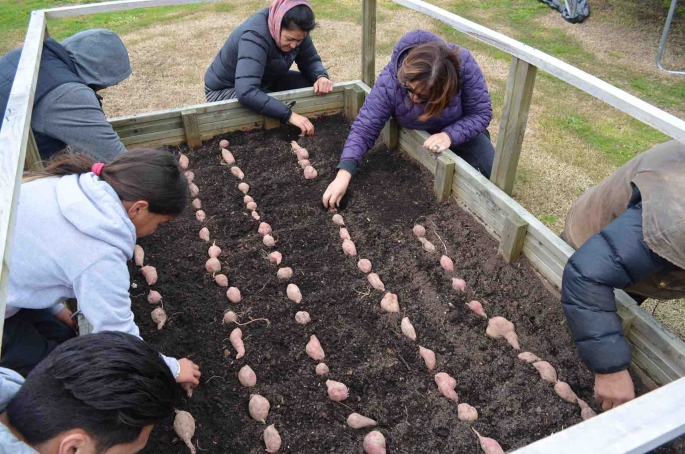Food grown locally, by locals, is at the heart of Kai Rotorua’s work.
Founding member Jasmin Jackson says Kai Rotorua, and its predecessor the Rotorua Food Network, came about from a shared passion for sustainable food.
One of their main projects this year is to grow kumara – a vegetable not commercially grown in the region – and teaching locals how to do it.
In October, Rotorua Boys’ High School and Mokoia Intermediate students will help with the mammoth task of hand-planting two acres of land in owairaka red kumara, riwai (Maori potato) and red rascal potatoes.
“The best way to learn how to grow things is to do it,” says Jasmin.
Vegetables will be sold through a local farmers’ market and organic shop to provide Kai Rotorua a source of income for other projects, says Jasmin.
“Te Puea Orchard is kindly allowing us to use two acres of their land for planting, which is fantastic. “They grow organically, which is a great fit with our sustainable food philosophy,” says Jasmin.
In April, a trial planting was conducted to identify which kumara would grow the best.
Fourteen kumara varieties were planted including modern and ancient types, says Kai Rotorua member Te Rangikaheke Kiripatea, who is leading the planting programme.
“We didn’t have much luck growing ancient varieties, but owairaka red – the red kumara you get at the supermarket – did really well.
“There’s quite a science to getting growing conditions right for the taputini and hutihuti [ancient kumara]. The environment is quite different now, and it was challenging to replicate those conditions. We need to do more work on growing these,” says Te Rangikaheke.
Bay of Plenty Regional Council is also on board with Kai Rotorua’s kumara growing plans. The council has contributed funds to further trials that will allow Kai Rotorua to scale up production of owairaka red to commercial quantities.
The trials investigate several different growing mediums – worm cast, compost and charcoal based-biochar – to see which produces the best results. Te Rangikaheke says that growth, yield, weight and other key variables will be recorded by local horticulture students from planting through to harvest to give the group good data about what works best.
But kumara planting is only one of many sustainable food projects that Kai Rotorua has on the go. Last year, they successfully planted 66 free backyard gardens for local whanau.
“We found that it’s a bit hard for people to get to community gardens, and also they aren’t that good for teaching people how to garden.
“But if it’s literally in your backyard, you’ll pull a weed out, and get more out of it,” says Jasmin.



0 Comments
Leave a Comment